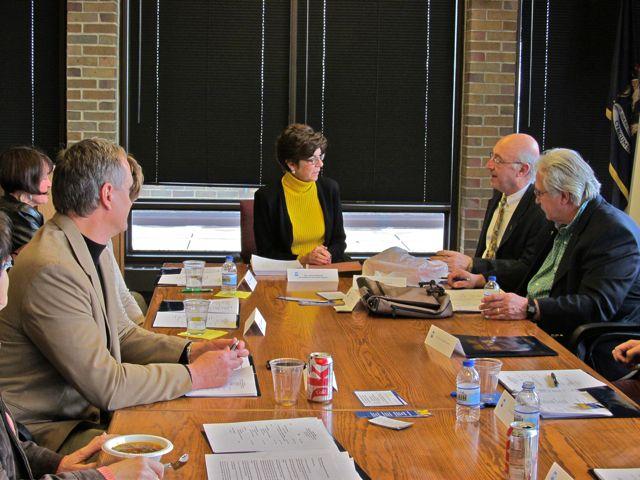Alumni Advised: “Let Public Officials Know What’s Going On”3 min read
Ann Arbor, MI — May 22, 2013 — “One of the things I always enjoy talking about when I meet with state officials in Lansing, federal officials in Washington, or others in government is how the University of Michigan School of Dentistry is involved in local communities across our state providing oral health care to patients in clinics. It’s a great way to let them know just how involved the School is with local providers and how they are working together to make a difference in the lives of thousands of people.”

That remark from Cynthia Wilbanks, vice president for Government Relations and special advisor to U-M President Mary Sue Coleman, brought smiles to the faces of the School’s Board of Governors during their spring meeting.
Wilbanks spoke on a range of topics, including state support for higher education.
State Funding for Higher Education
“During the past ten years, we have seen a dramatic decline in state support for higher education,” Wilbanks said. She presented Board members with a chart showing state support dropping more than 50 percent, from about $13,260 per student in 2002, to about $6,400 today. (See Fig. 1). She said more students are enrolled at U-M now compared to 2002, which accounts for some of the decline in state support per student. “But the state is annually spending about $1 billion more for the Department of Corrections than for higher education,” Wilbanks said.
She said that none of the publicly supported universities receives more than 30 percent of its revenues from the state. Because of a decline in state funding, tuition and fees at U-M have increased. (See Fig. 2).
Wilbanks said voter-approved term limits on state legislators have hurt. Since state representatives have a six-year limit and state senators are limited to eight years in office, “they are not in a position to see the long-term results of their decisions and then take corrective action, if needed.”
Michigan’s Advantage
Other funding, such as research funding from the National Institutes of Health, brings additional dollars to U-M, as do partnerships with the private sector. “But the key to the state’s long-term success in turning around its economy is a productive workforce, and that requires increased funding for higher education,” she said.
Pointing to North Carolina as an example, Wilbanks said that state addressed the decline of two of its major industries, tobacco and textiles, by making a long-term commitment to funding post-secondary education.
“Michigan is in a similar position given the dominance of the auto industry and the companies that support it,” she said. “All of us, whether we are officials of this University or alumni, need to emphasize the importance of funding higher education to our public officials, otherwise Michigan’s opportunities for growth will be modest, at best, in the future.”
Pointing to the U-M Health System, Wilbanks said that many people using its services “come from all across Michigan, even around the world, because of the quality and level of care they receive.”
Prospective students, she added, “apply for admission to Michigan because they realize they will receive an unbelievable education and an opportunity to succeed that they won’t find anywhere else.”
Wilbanks told the Board of Governors, “What we do here at Michigan be it in our Health System or at the School of Dentistry, is very important to Michigan, its citizens, and the world. Let your local and state officials know what’s going on at your alma mater, including the dental school,” she said. “Our challenge is to stay the course and maintain a high level of awareness.”
